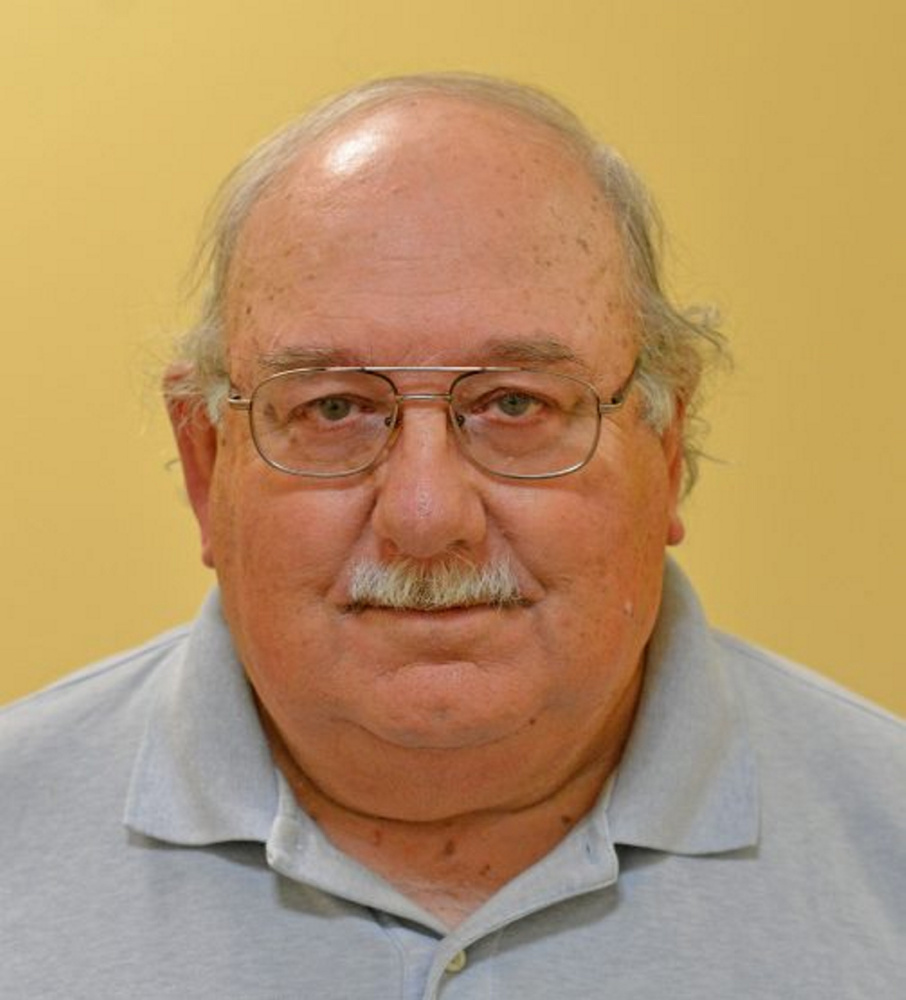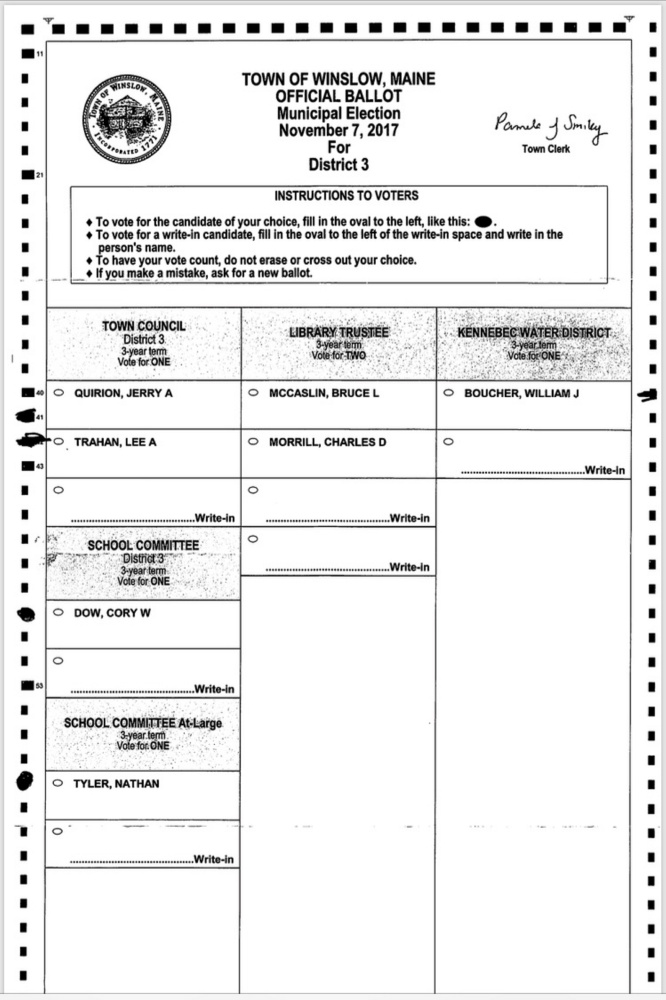WINSLOW — The Maine Supreme Judicial Court is asking two parties involved in a lawsuit about a disputed sloppy ballot, which could decide a Town Council race in Winslow, to provide legal arguments by Thursday about whether the ballot in question is valid.
Jerry Quirion, a sitting town councilor representing District 3, has called into question a recent election recount that resulted in a tie with his challenger, Lee Trahan, and filed a suit asking that a single ballot be invalidated.
During the regular election in November, Quirion, 71, was declared the winner over Trahan, 46, a member of the school board, by a margin of three votes. However, Trahan requested a recount, which ultimately resulted in a 173-173 tie.
The state’s highest court sent a procedural order to Winslow’s town attorney, Bill Lee, on Dec. 18, asking that the town clerk, Pam Smiley, send a copy of the disputed ballot to the court, as well as a copy to each candidate.
The order also asks that each candidate send a memorandum addressing whether the ballot is valid, whether there was any irregularity or inaccuracy in the town clerk’s conduct of the recount or her resulting certified recount, and whether to count the disputed ballot for either candidate.
After the court receives the memoranda from the candidates, Lee said, the court could respond with one of three answers: The ballot is valid and should count for Trahan, thus certifying the tie; the ballot is invalid and the vote does not count, and therefore Quirion is the winner; or the court says it should not be deciding this case at all.
Trahan said he was unsure Wednesday afternoon whether he would have an attorney send an argument to the court or if he would write a statement himself. He said he was out of town and would review the matter further when he comes back to Winslow on Thursday and would decide then on how to proceed.
Attempts to reach Quirion’s attorney, Ron Bourget, for comment Wednesday were unsuccessful. However, Bourget told the Morning Sentinel in November that the ballot in question should not have been counted at all.
“It is evident to us that the ballot is invalid,” Bourget said. “Jerry has more votes.”
DECIPHERING VOTER INTENT
While the court will consider the arguments from the candidates, Lee said the case will be decided on whether the justices can decipher the voter’s intent.
“You can’t call up the voter and ask what he or she intended,” Lee said in an interview Tuesday. “It either stands or falls within the four corners of the ballot.”
Lee said people make mistakes on many ballots, but clerks and courts must do their best to interpret intent so that they don’t disenfranchise voters.
There’s no disputing that the contested ballot was filled out sloppily. The person who filled out the ballot failed to follow directions and did not fill in any ovals next to candidates’ names, but rather made marks along the ballot’s dotted border.
The voter appears to have made marks to the left side near both Quirion’s and Trahan’s names, although the mark for Trahan is a bit larger and nudges over a boxed border a tick away from the oval.
In an interview earlier this month, Daniel Walker, a partner at Preti Flaherty law firm in Augusta, who has been practicing election law for 17 years, said the court will be following the secretary of state’s rules on determining voter intent as the guidelines used to decide whether the vote is counted for Trahan or thrown out. The decision will come down to the court’s interpretation of the ballot in regard to two provisions within that set of rules.
The first of such provisions, under section 4, determining voter choice, is categorized as marks made outside the voting indicator, or put more simply, the ovals next to a candidate’s name. That provision states a vote must be counted if “the mark made by the voter is near, although not within, the voting indicator and is closer to the indicator or name of that candidate or ballot question choice than to any opposing candidate or ballot question choice.”
Walker said the court might find this provision persuasive. He said the ballot was somewhat consistent since the voter made similar marks along the border next to the uncontested candidates for School Committee, on the left, and a seat on the Kennebec Water District, on the right, but made no marks for two uncontested candidates running for library trustee in the middle of the ballot.
However, Walker said the mark near Quirion’s name adds doubt to whether that rule would decide the matter.
Walker said if he were the judge reviewing the ballot, he would determine the voter’s action to be an overvote. An overvote, which falls under section 3, invalid votes, takes place “if the voter indicates a choice for more candidates for an office than there are vacancies to be filled, or indicates more than one choice for a ballot question.” An invalid overvote may not be counted.
Walker sees the vote near Quirion’s name as an overvote, but said it would be a close call and will weigh heavily on what the court sees as the voter’s intent.
“Every case is going to be slightly different,” Walker said. “But (the court’s) overwhelming and No. 1 concern is voter intent.”
Quirion originally filed a suit disputing the ballot in Kennebec County Superior Court, and papers were served to Lee on Dec. 6. However, when Lee read the statute applicable to the case, he said he surmised that the superior court was not the correct venue for this suit.
The statute, 30 MRSA 2531-B, states that municipal clerks conduct recounts but must follow the procedure outlined in 21-A MRSA 737-A. In Subsection 10 of that statute, it states that in all elections, except those for the Senate and House of Representatives, if there are enough disputed ballots to affect the outcome of the election, that the disputed ballots are sent to the Supreme Court for resolution.
Lee then wrote a letter to the Supreme Court asking them to take the case. The superior court case then was halted and remains so pending the high court’s actions.
Lee said that to his knowledge, this is the first case of a disputed ballot in a municipal race to be considered by the state’s high court.
The court could ask for additional arguments, Lee said, but it probably will decide the matter based on the memoranda provided by the candidates. He thinks the court will make its decision within two weeks.
If the court throws out the ballot, Quirion will be named the winner by one vote.
If it is decided that the vote counts, and that the candidates are tied, the Town Council will vote on whether to call a special election for the seat, which is tentatively scheduled for March 13.
If the court rejects the case, the proceeding that was halted in the superior court probably will resume.
Emily Higginbotham — 861-9239
ehigginbotham@centralmaine.com
Send questions/comments to the editors.






Comments are no longer available on this story